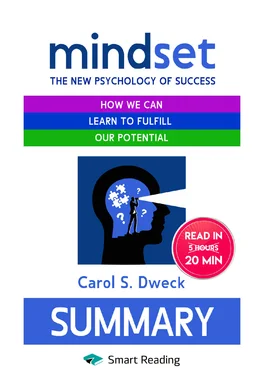Summary: Mindset. The New Psychology of Success. How we can learn to fulfill our potential. Carol S. Dweck
Автор:
Carol S. Dweck
Оригинальное название:
Mindset. The New Psychology of Success. How we can learn to fulfill our potential
www.smartreading.ru
How does a "fixed" mindset differ from a "growth" mindset?
Since the beginning of time, philosophers have argued about whether the qualities of a human personality are innate and unchanged throughout our lifetime, or are constantly changing and developing. The research conducted by the author over the course of 30 years has shown how the answer to this question affects the daily life of every person.
Believing that your qualities are carved in stone indicates that you have a fixed mindset, which creates an urgency to assert yourself over and over and prove to yourself and others that you are an intelligent and worthy member of society. Each situation is evaluated by such people from the position of: Will I succeed or fail? Will I look smart or dumb? Will I be accepted or rejected? Will I feel like a winner or a loser?
People with a growth mindset believe that personality traits are only a starting point and can and should be developed by putting in effort and relying on the help of others.This does not mean that people with a growth mindset believe that everyone can become an Einstein or Beethoven, but they are convinced that it is impossible to know your potential or be able to predict what glorious achievements many years of hard work will lead to.
Intriguingly, experts did not foresee a bright future for either Marcel Proust, Elvis Presley, or Charles Darwin. People with a growth mindset understand that it takes time to reveal a person’s full potential. For example, during astronaut selection, NASA rejects people with pristine histories of only success and instead selects people who have had significant failures but who have bounced back from them. One of the researchers cited by Dweck studied the stories of 120 prominent musicians, athletes, and scientists. Most of them did not show any signs of future achievements in childhood, and only the undying interest, diligence, dedication and support they received from others brought them to the pinnacle of success.
Growth mindset people feel best when they are putting their strength to the test and are overcoming difficulties. People with a fixed mindset thrive when everything is under their control. If they suddenly stop feeling smart and talented, they immediately lose interest. A person with a fixed mindset must always feel like he or she has achieved perfection, whereas growth mindset people feel that the process of learning, overcoming difficulties and moving forward is what matters.Why is it so critical for people with a fixed mindset to be impeccable right now? Because they believe that once their personality and abilities have been assessed this recognition will stand forever. Believing in the permanence of their qualities, people find themselves in a situation where they are evaluated negatively, and their fixed mindset deprives them of the ability to cope with failure. If you believe that a person is constantly developing, then failures do not turn you into a loser, but rather it is just another step along the path of development.
Fixed mindset people are convinced that since they have talent and abilities, then it is no longer worth making any efforts to develop them. Effort is for those who lack ability. From the point of view of a person with a growth mindset, efforts are admirable, they "switch on" your abilities and turn them into achievements. The growth mindset allows people to appreciate what they do, regardless of the result. Many people with a growth mindset reach the heights of success, not striving for it specifically, but by simply doing what they love.
John McEnroe, World No. 1 in tennis, had a fixed mindset for four years. He believed that sports talent determines everything and if you are successful, then you are better than other people. But Michael Jordan, one of the greatest basketball players ever, was a growth mindset person and claimed that he was the same as all other people and achieved success as a result of incredible training regimen.
Of course, failure is always painful, but it doesn’t define your personality. It is only a challenge to be dealt with and a useful lesson from which you can learn. People with a fixed mindset, instead of working on overcoming a failure, "work" on their self-esteem, trying to raise it by comparing themselves with those who turned out even worse. Another way to "tweak" the self-esteem of fixed mindset people is to find excuses for their failure or shifting the blame to others. The same McEnroe explained his losses by the fact that it was either too hot or cold, or that he was undertrained or overtrained. You can only learn from mistakes when you admit them.
The author observed schoolchildren who received bad grades. Pupils with a fixed mindset explained their underperformance by saying that they were "stupid", that their teacher was to blame, etc. Kids with a growth mindset also experienced difficulties with their studies, but their reaction was to work harder. Schoolchildren with a fixed mindset stated that their primary goal in school was to learn adequately with minimal effort. It is interesting that students with a fixed mindset memorize material while preparing for a test, while students with a growth mindset try to understand a subject and use this knowledge to figure out what mistakes they made. If every person has the potential to grow, how can we give him/her the confidence to achieve results?
As a result of a test, one group of students was praised, saying that they were "capable and smart people", and the other group was given different feedback, being told "you guys did a great job." Then it turned out that the "capable smart ones" did not want to perform a more difficult task, fearing that they would live up to expectations of others and then everyone would discover that they were not so smart after all. Students who were praised for their "great effort" took on the difficult task with gusto. For them, possible failure meant only that they had to try harder or change their solution strategy. They did not think that failure somehow reflected on their level of intelligence.
Конец ознакомительного фрагмента.
Текст предоставлен ООО «ЛитРес».
Прочитайте эту книгу целиком, купив полную легальную версию на ЛитРес.
Безопасно оплатить книгу можно банковской картой Visa, MasterCard, Maestro, со счета мобильного телефона, с платежного терминала, в салоне МТС или Связной, через PayPal, WebMoney, Яндекс.Деньги, QIWI Кошелек, бонусными картами или другим удобным Вам способом.












